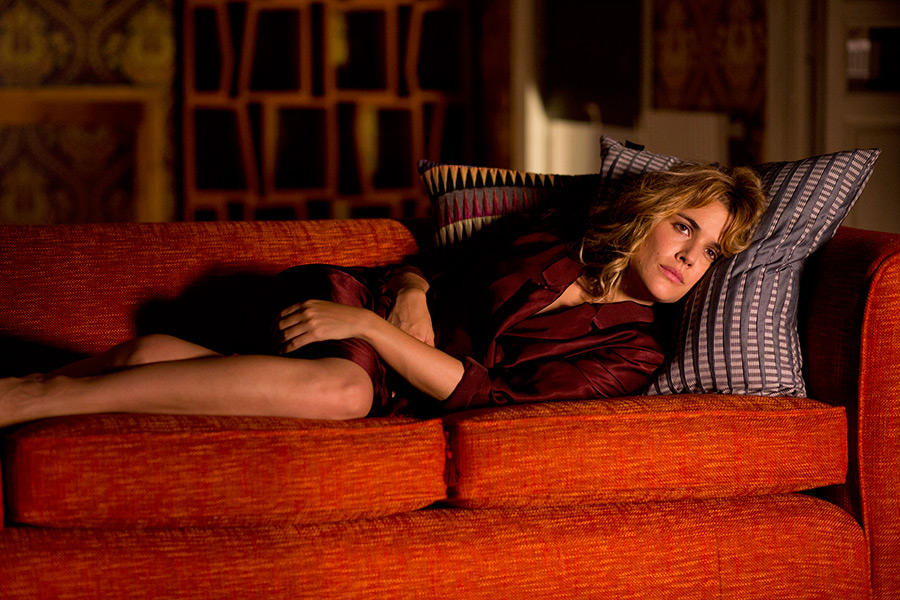“Julieta,” opening Jan. 13 at Ritz Theatres, has the often-outrageous gay filmmaker Pedro Almodóvar working in a more restrained mode. This drama, based on three short stories by Alice Munro — “Chance,” “Soon” and “Silence” — features the title character played by two different women: Adriana Ugarte is the young Julieta and Emma Suárez is the older Julieta. The conceit works well as this story crosses time and plays with issues of identity. However, some of the connections Almodóvar wants to make require viewers to fill in the blanks.
The film opens strongly with Julieta (Suárez) preparing to go to Portugal with her lover, Lorenzo (Darío Grandinetti). Yet when she has a chance encounter with Beatriz (Michelle Jenner), who was best friends with Julieta’s daughter Antía (Blanca Parés), Julieta is so taken aback that she calls off the trip and moves back into the apartment building where she had lived with Antía. Julieta, it is revealed, has not seen Antía in over a decade. As a flood of memories comes back to haunt her, she writes about her relationship with Antía, and how their estrangement occurred.
The plot certainly yields to Almodóvar’s signature approach, with flashbacks and time shifts that reveal secrets and desires of his heroines. “Julieta” is very much in the vein of the director’s previous mother/child films, from “High Heels” to “All About My Mother” that also focused on women trying to overcome some trauma from the past. But despite the synergy with the material, “Julieta” seems to lack some of the Spanish bad boy’s typical verve. Yes, there are the director’s signature reds, from a dress the title character wears to the painted walls of Julieta’s apartment, but mostly this film feels stiff, with the characters’ rigid behavior creating drama but not tension. It is fine that Almodóvar is not infusing this material with his cheeky sense of humor, but there is just not enough juice in what he does present.
A large swath of the film unfolds in a flashback. One key episode has the young Julieta (Ugarte, sporting a punk-like ’80s-style blonde hairdo) meeting an older man on a train. She initially shuns him, but their encounter has extreme repercussions for Julieta. Most significantly, it prompts her to meet Xoan (Daniel Grao), a fisherman with whom she becomes romantically attached. Julieta turns up at Xoan’s house several months after their initial encounter, just after his comatose wife has passed. She also discovers Xoan has been seeing Ava (Inma Cuesta), which makes her jealous. However, the women soon become fast friends. While there is a hint that Beatriz and Antía have a romantic relationship, this possibility goes largely unexplored.
Almodóvar keeps spinning out these characters’ complex lives, but every time the film seems to be getting interesting, it hits a roadblock. Julieta’s search for her daughter becomes as frustrating for the audience as it is for her character. As Julieta responds to the various men and women she meets — even her exchanges with Xoan’s housekeeper, Marian (Almodóvar regular Rossy de Palma), are freighted with meaning — viewers will not necessarily feel Julieta’s emotions as deeply as she does. Ugarte and Suárez are admirable, giving distinctive performances at the title character. They make the heroine both sexy and full of despair, respectively, but ultimately, the character of Julieta is more enigmatic than sympathetic.
The film’s larger problem is that Almodóvar, who can be accused of having tried too hard in the past, is trying too little in “Julieta.” He may guide the viewer through a complex plot with temporal and identity shifts, but he makes the audience work far too hard for too little payoff. The central relationship between mother and daughter has more power for the characters than viewers.
It is as if the director wanted to keep things ambiguous to build tension, or is being true to Munro’s texts, but his plan backfired. Various subplots involving Julieta’s parents, or Lorenzo following Julieta to understand her strange behavior, produce more fizzle than fireworks.
This is not to say “Julieta” does not have its pleasures. The romantic scenes between Julieta and Xoan generate some passion, and the cinematography, as one has come to expect from an Almodóvar film, is glorious. “Julieta” even ends on a graceful note that is somewhat satisfying; it is just a shame that much of what transpired before the final scene is so wearisome.

